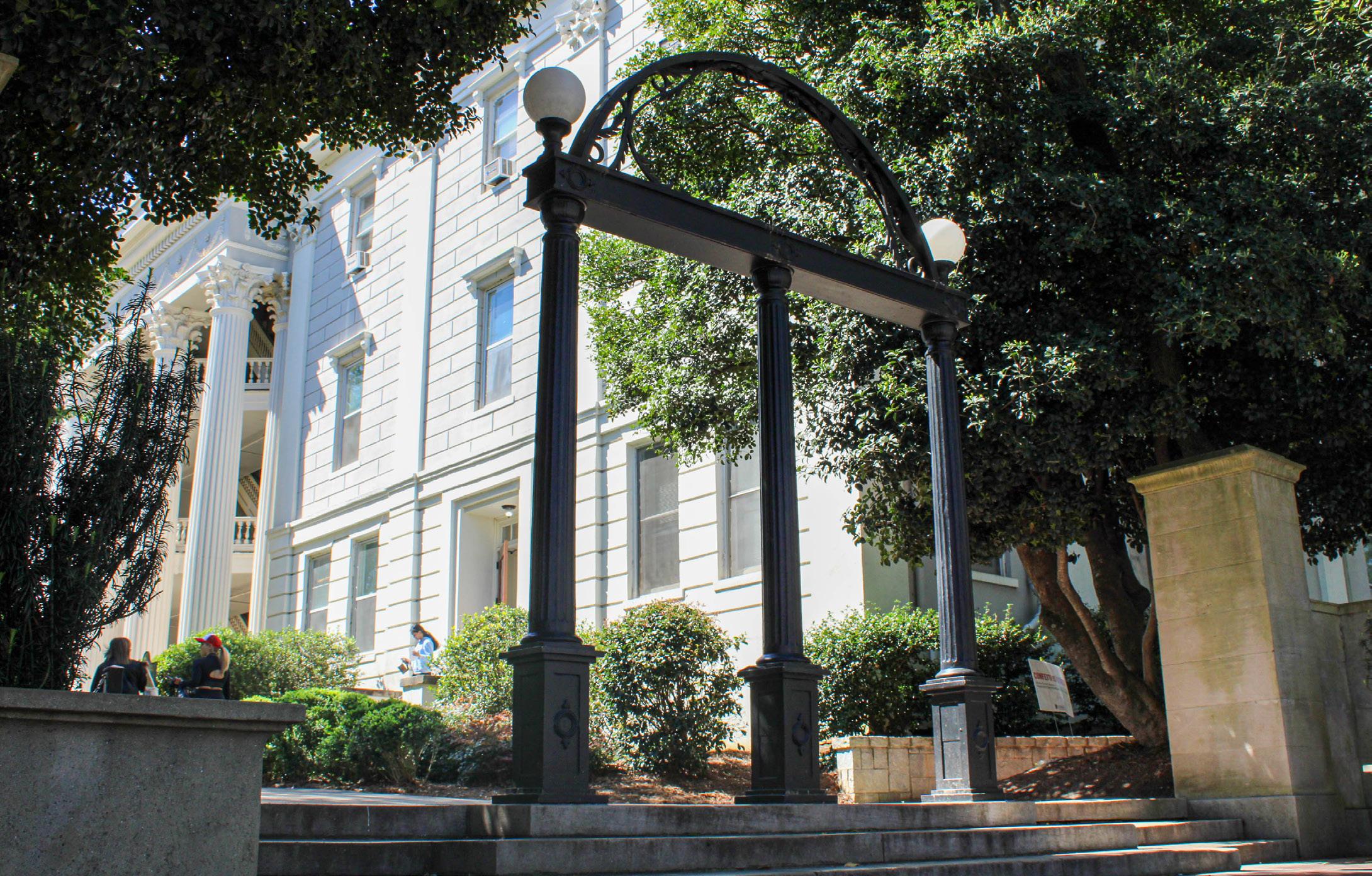
5 minute read
How It Started
The intertwined history of Athens and UGA
Did you know that public higher education in America has its roots here? The founding of the University of Georgia, and thus the beginning of Athens history, dates to 1785, when Abraham Baldwin and members of the Georgia legislature chartered the first publicly funded institution of higher learning. The school was originally named Franklin College, in honor of Benjamin Franklin, and is considered one of the oldest public universities in the country. (It became the University of Georgia in 1859 after the founding of the institution’s college of law.)
Advertisement
To contribute to the building of the campus, lawmakers sold 40,000 acres of state land — rolling, riverside terrain — and received a generous donation of 633 acres from John Milledge, an early politician and a founder of the city. The campus was officially built in 1801, and the original area is now part of what’s considered North Campus, a leafy hilltop quad of neoclassical buildings perched above the Oconee River.
That same year, Clarke County was established and named in honor of a Revolutionary War hero, Elijah Clarke, who was also a Georgia legislator. The city of Athens was officially incorporated shortly after in 1806, named by Milledge for Greece’s classical city of higher learning.
As the school grew, so did the city of Athens, and it became a hub of both bustling culture and industry, with textile mills, brickworks and the railroad as primary parts of the economy. With the university, it was able to weather the Civil War and Reconstruction and prosper again.
In the 20th century, the city was home to a thriving Black middle-class community, with businesses centered around Washington and Hull streets, and came to host numerous civil rights protests in the 1960s. This period saw the integration of the university by African American students Charlayne Hunter-Gault and Hamilton Holmes in 1961, and UGA came to be known as a significant part of the Civil Rights Movement.
The Stats
Population of Athens-Clarke County: 127,358
Student enrollment: 40,118 (undergraduate 30,166)
Students hail from: 41 states and 57 countries
Government leadership: Mayor Kelly Girtz
Fun fact: The first building on UGA’s campus was a 20-foot-square log frame.
The local music scene hit the national stage in the 1970s and 1980s with the rise of major bands like R.E.M. and the B-52’s. The Georgia Theatre and the 40 Watt Club became landmark venues, and the culture of music continues to shape and define the city. In the 1990s, downtown Athens saw a $100 million revitalization that restored its vibrant, small-town vibe, with storefronts filled with local shops and cafes that draw visitors from all over. In 1990, the city and county unified their governments to become Athens–Clarke County.
It was during that time that the University of Georgia witnessed a great increase in recognition and the number of enrolled students as the state of Georgia established the HOPE Scholarship. This allowed students to receive financial aid that encouraged them to stay in the state for their education and help build up Georgia’s educational system. The school, and thus Athens itself, also experienced national attention with the increasing success of the school’s athletic program, especially its champion football team, which draws more than 92,000 fans to the town on Saturdays in the fall. Now, the team ranks #1 in the Southeastern Conference (SEC) after winning the National Championship twice consecutively.
But Athens is a draw all unto itself, laying claim to a lively music culture, an abundance of art, activist movements, festivals, outdoor activities, eclectic restaurants and more that make it one of the South’s great towns.
1785
The first publicly funded college in the U.S. is chartered by the Georgia state legislature, making UGA the birthplace of public higher education in America.
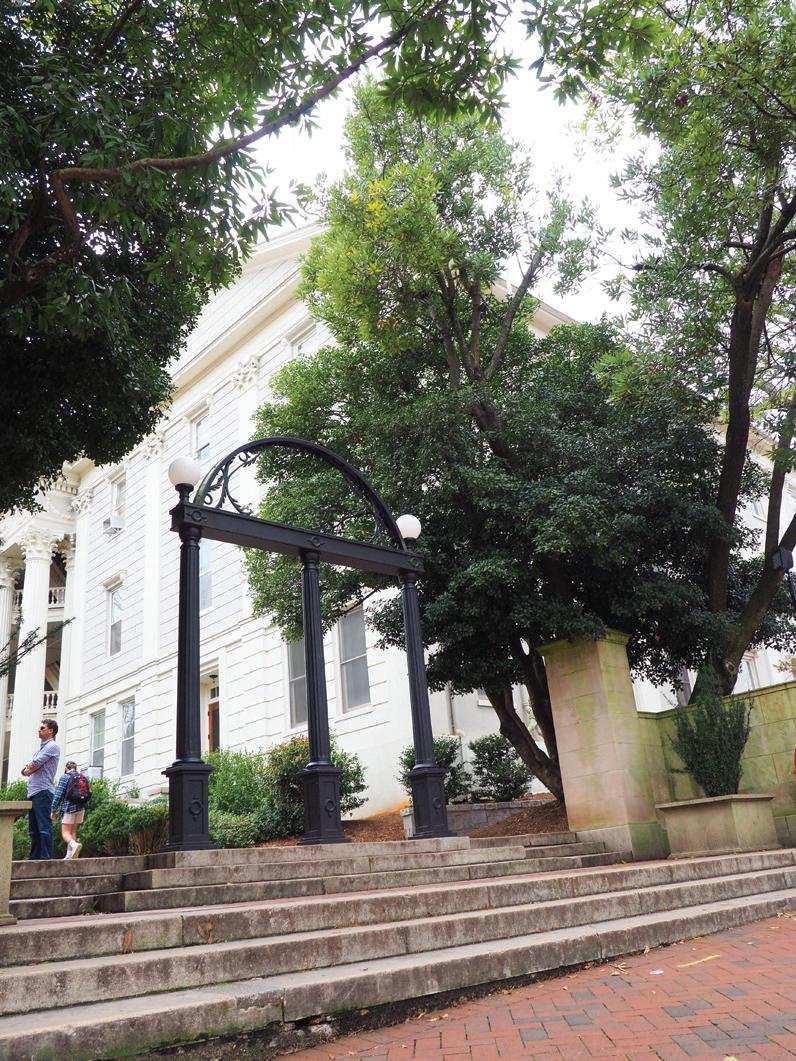
1801
The board of trustees selects a site above the Oconee River, and John Milledge (later the governor of Georgia) purchases and then donates 633 acres for the college, now known as North Campus.
1804
The first class of students graduates from what was then known as Franklin College (named for Benjamin Franklin).
1806
The city of Athens is incorporated in 1806.
1859
The law school is founded and the school is renamed the University of Georgia.
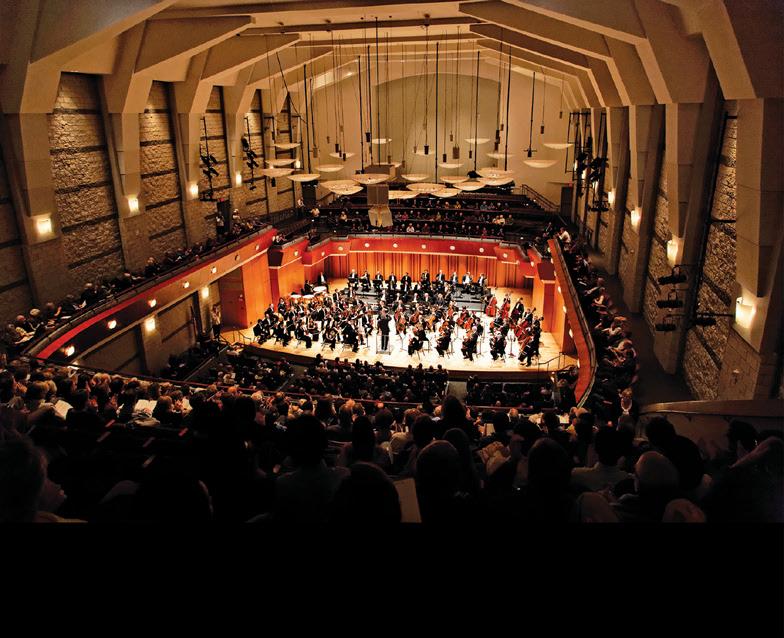
1862
Congress passes the Morrill Act to raise money for colleges to teach agriculture and mechanical arts. When UGA receives these funds a decade later, it expands its curriculum.
1918
White women are allowed to enroll at UGA.
1942
A Navy preflight training program operates on campus as part of the wartime effort.
1961
Charlayne Hunter and Hamilton Holmes are the first Black students to attend UGA.
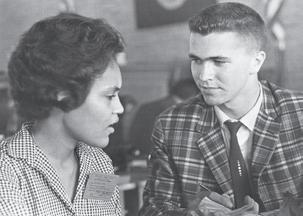
1964 Stegeman Coliseum, originally named the Georgia Coliseum, is built for basketball and agricultural events.
1980
R.E.M. plays its first show at a friend’s party.
1990 Athens forms a unified government with Clarke County, creating Athens-Clarke County.

1992
The HOPE Scholarship is created, encouraging Georgia students to remain in the state. In 1992, just 2,993 first-year students enrolled in the university. In 2022, that number was 16,729.

1996
Sanford Stadium is repurposed as a soccer venue for the Olympic Games.

2015
The College of Engineering opens, bringing the total of colleges and schools within the university to 18.
2020
The College of Education is named in honor of Mary Frances Early, the first Black student to graduate from UGA.
2023
The University of Georgia football team wins its third national championship; its second consecutive title.






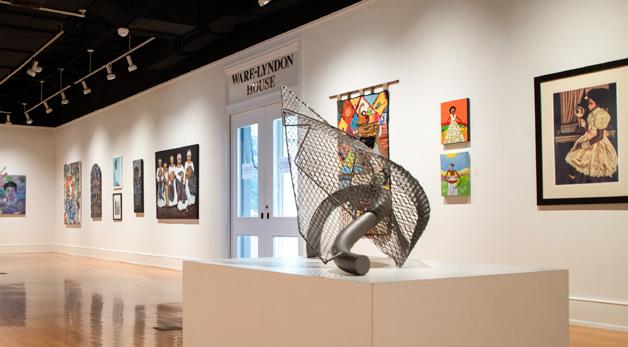

Q&A
Hope Iglehart
Director of Engagement and African American Heritage at Historic Athens

Hope Iglehart, a Piedmont University alum, was named the first Director of Engagement and African American Heritage at Historic Athens in January 2022. Her background with Historic Athens goes far beyond this position, as she has worked in a variety of community-minded roles with the organization and elsewhere in Athens.
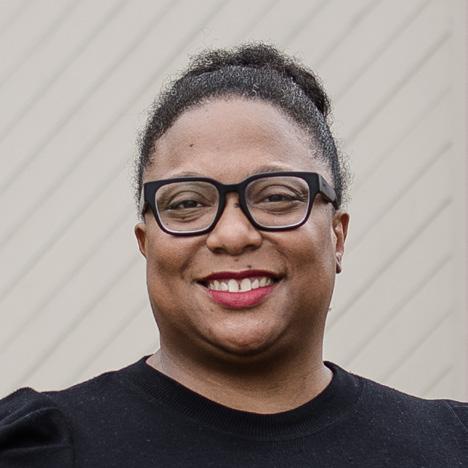
Previously an educator, funeral director and instructor, her passion for shedding light on marginalized and underrepresented groups has led her to this position that has brought a further sense of belonging for these communities in Athens.
What brought you to your current position?
I’ve been involved in the community since returning from college… After leaving my last position, which was president of Gupton-Jones College of Funeral Service, I had the opportunity to be the diversity hire for Historic Athens. I previously worked with Historic Athens, which at the time was Heritage Foundation, when I was working to get the local historic designation for the Reese Street community, which is the first historically African American neighborhood to get that local historic designation.
What do you believe your role in the community is?
It creates the voice for the community as a whole. When you think about historic preservation, you think of large calm houses and things of that nature. So we kind of have changed — I’m able to change the narrative on what is historic preservation, and to be inclusive of other communities within the whole of Athens. So it’s exciting.
Why do you feel like this position was necessary in Athens?

One of the things I will say is, as someone in diversity and inclusion and belonging—we think about Athens, and Athens is known for music, culture, UGA, but one of the things we need is to help with a sense of belonging and inclusion for everyone. And so that’s why it’s so important because with our youth, if they don’t feel like they belong, if they don’t feel like they’re included, then they don’t take ownership of the spaces that are so beloved. It’s important for the community to feel like they are a part of everything that’s great. And so that’s what we’re doing, bringing voice to marginalized communities, under-acknowledged communities, and giving them a voice.
What do you do for fun in Athens?
My favorite thing to do is wine tasting, and I enjoy trying new wines at the Lark Winespace. It’s not far from work, and I can walk over.
What’s your favorite historic building in Athens to visit?
My favorite building is the Morton Theatre. It has a lot of history and once housed a lot of Athens businesses and was an important building for Hot Corner. (See page 50 for more on the Morton Theatre and Hot Corner.)
Interview by Dawn Sawyer








